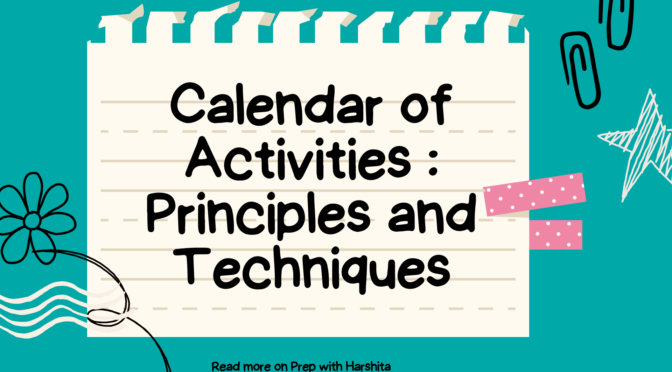A calendar of activities in an educational institution provides a comprehensive overview of events, programs, and important dates throughout the academic year.
Here are some principles and techniques for developing a calendar of activities:
Alignment with Educational Goals:
- Ensure that activities align with the school’s mission, vision, and educational objectives.
- Link activities to specific learning outcomes and curriculum goals.
Balanced Distribution:
- Distribute activities evenly across the academic year to avoid overloading certain periods.
- Consider the workload on students and staff when scheduling events.
Flexibility:
- Build in flexibility to accommodate unexpected events or changes in the schedule.
- Allow for adjustments based on feedback and evolving circumstances.
Prioritization:
- Prioritize activities based on their importance to the school’s mission and the needs of the students.
- Ensure that essential academic and extracurricular activities are given due attention.
Also Read : School Organization and Management
Techniques:
Collaborative Planning:
- Involve various stakeholders, including teachers, administrators, students, and parents, in the planning process.
- Seek input and feedback to ensure a well-rounded calendar.
Color-Coding:
- Use color-coding to categorize different types of activities (academic, cultural, sports, etc.).
- Enhances visual clarity and helps stakeholders quickly identify the nature of each activity.
Regular Review and Updates:
- Conduct regular reviews of the calendar to assess its effectiveness.
- Update the calendar as needed, incorporating new events or adjusting dates.
Feedback Mechanism:
- Establish a mechanism for collecting feedback on past activities.
- Use feedback to improve future planning and address any concerns or suggestions.
Use of Technology:
- Utilize calendar tools, apps, or software to create and share the calendar easily.
- Ensure that the calendar is accessible to all stakeholders through digital platforms.
Also Visit : Prep with Harshita



16 thoughts on “Calendar of Activities :Principles and Techniques”